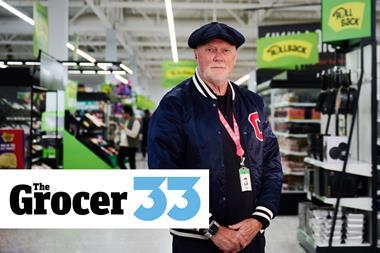
The government has published its 10-year health plan, which leans heavily on supermarkets and the food and drink sector to help shape the health of the nation in its ongoing fight against ill health and obesity.
Announced this morning, the plan includes a radical overhaul of the NHS, with a focus on food and drink forming a key part of its ”prevention rather than cure” approach.
Launching the plan in London later today, PM Keir Starmer is expected to announce a series of “fundamental shifts” into how the UK’s health system currently works.
The new system has been designed to “reach patients earlier, to catch illness before it spreads and prevent it in the first place, by making the healthy choice the easy choice”.
Mandatory reporting and health targets
Labour wants food and drink companies to play a greater part in its “moonshot” plan to cut obesity.
It has confirmed plans to introduce mandatory healthy food sales reporting for “all large companies in the food sector” by the end of the current Parliament. The “world-first” policy will act as a “baseline” to improve future policies, which it hinted would focus on improving transparency.
The data will also “support customers with their choices” and could be used by investors as a tool to asses which companies to target, the policy document said.
Crucially, the data will be used to shape a second major policy, in the form of mandatory health sales targets. Confirming the plans, the government will work with the Food Strategy Advisory Board to fully form the policy, which as of yet has no introduction date.
“Targets will be mandatory but companies will have the freedom to work out how to achieve the target, whether through reformulation, by changing their layout, introducing new healthy products or through changes to customer incentive and loyalty schemes,” the policy document says.
In another major move to affect supermarkets, the government has confirmed it will introduce a ban on buy one get one free and multibuy deals on “unhealthy food”, from 1 October 2025.
The proposals were originally posed alongside the introduction of HFSS regulations in October 2022, however had been delayed by multiple governments.
Supermarket bosses have largely welcomed mandatory health reporting. Sainsbury’s CEO Simon Roberts – who sits on the Food Strategy Advisory Board – hailed the proposals as a “moment in time” for the sector to “raise the bar” on health during the supermarket’s quarter one results earlier this week. However, it was vital that the proposals applied to the entire food and drink sector, and not just supermarkets and manufacturers, he said.
Tesco, Waitrose, Morrisons, Asda, Aldi and Lidl along with FDF boss Karen Betts have also all previously publicly supported the introduction of mandatory health reporting.
Pureplay grocer Ocado has also supported mandatory health reporting “in principle”, however CEO Hannah Gibson has echoed Roberts’ concern that the measures would need to apply across “the wider food industry” to be “effective”.
Alcohol labelling but no ad ban
Meanwhile, plans to restrict the advertising of alcohol have been scrapped following widespread industry backlash.
The 10 Year Health Plan contains no concrete commitment to introduce either HFSS-style restrictions on alcohol advertising pre-watershed and online. Nor does it include any mention of introducing minimum unit pricing in England.
In fact, the only new measure included specifically to target alcohol-related harm is a “mandatory requirement for alcoholic drinks to display consistent nutritional information and health warning messages”.
The warnings would “ensure greater public awareness of the health risks of alcohol consumption and help consumers make more informed, healthier choices”, the government’s plan said.
Beyond measures to tackle alcohol-related harm, the government plans to consult on changing the upper strength threshold at which a drink may be described as alcohol-free to 0.5% abv, which would bring the UK in line with international standards.
It will also “explore options to restrict access” to low & no-alcohol products to under-18s.
The Portman Group welcomed the government’s commitment to revisit alcohol-free descriptors, but said it did not believe there was a case for wider health warnings on packaging.
“Aggressive lobbying” by alcoholic drinks suppliers had caused the government’s strategy to tackle alcohol harm to be “stripped”, said Jem Roberts, head of external affairs at the Institute of Alcohol Studies.
“It’s frankly embarrassing to launch a ‘prevention’ plan that ignores the most effective ways to prevent alcohol harm,” said Roberts. “Deaths are at their highest level in decades and have risen over 40% in recent years – yet the government has dodged proven policies like minimum unit pricing, marketing restrictions, and availability controls.”
A ‘smoke-free’ generation
The government reiterated its plan to create “the first smoke-free generation” through new laws that mean “children turning 16 this year and those younger than them will never legally be sold tobacco, guaranteeing a long-term end to the sale of tobacco products across the country”.
This will come via the “world-leading” Tobacco & Vapes Bill, which will also halt the advertising and sponsorship of vapes and other nicotine products.
In June, the government banned single-use disposable vapes but “we will go further” it said. While vapes are effective in helping some adults quit their reliance on nicotine, the growth in young people vaping “is plainly unacceptable”.
The bill will also provide government with powers to restrict point of sale displays, packaging and flavours, particularly those that appeal to children. These new regulations will be consulted on “as soon as possible” after the bill receives Royal Assent.
Soft drink changes
As widely expected, the government is to review the Soft Drinks Industry Levy, which has not risen in line with inflation since it was first introduced in 2018. A consultation on proposals to drive further reformulations is already underway and includes provisions to end the exemption for milk-based drinks.
In line with commitments made prior to last year’s general election, the government will also ban the sale of high-caffeine energy drinks to under-16-year-olds.



















No comments yet